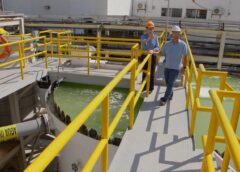NEW YORK (June 15, 2022) – Water – it’s one of the greatest challenges all nations face today. Though it covers about 71% of the earth’s surface, more than 97% is found in the ocean, unusable for drinking, growing crops and most industrial uses. In fact, less than 3% of the world’s water is fresh, and, of that, less than 1% is available for human consumption.
Globally, families and households consume only a fraction of the available fresh water. Agriculture uses 70% while 19% goes to industry. Only 11% is used by households. With water this scarce, we need to think about the importance of water conservation, maintaining access to safe fresh water for people where it is needed, while also endeavoring not to deepen other water crises we will face in the future.
Potentially compounding the water crisis in America is a new urgency to “build it here” and help reduce the nation’s dependence on global supply chains for core products. New industrial complexes, such as those for battery and semiconductor chip plants, and the expansion of existing automotive centers to build electric vehicles, are evidence of this trend. These are all water-intensive projects and are being built in the U.S. right now.
Toyota has long been a leader in using less water to produce its vehicles, a practice of growing importance especially in water-stressed areas, such as California, Texas and Mexico.
“At Toyota, we know our collective future – our health and well-being – depends on our ability as a society to focus on collective issues, like the reduction of water,” said Kevin Butt, Toyota Motor North America’s environmental sustainability director. “To solve our own puzzle, we aggressively explored a variety of options to find the one that would best meet our needs and, in this case, it was clear the fastest way to reduce the greatest amount is by collecting and reusing water in addition to reimagining our manufacturing process.”
The technology and innovation to capture rainwater to use over and over again in manufacturing is here now, and we will take a close look at how brilliant minds are determined to help solve these important water access issues.
Dedicated scientists and researchers are determined to help solve these important water access issues.
WATER: We Have Too Much, But Not Enough, zooms in to examine the latest science, learnings and developments undertaken by one of the nation’s largest manufacturers aiming to become carbon neutral in its facilities by 2035, in the world premiere set to air on June 17 at 5 p.m. (ET) on the Science Channel and June 23 at 2:30 p.m. (ET/PT) on MotorTrend TV and on demand on the Discovery Science GO APP.
The program is narrated by Adrian Grenier with reports from Neka Zang at distressed areas in California.
How does climate change affect access to clean water throughout the United States, especially in drought-prone regions? How can we reduce the amount of water we consume every day while new manufacturing plants and assembly centers moving in can use the latest innovations and technologies to help reduce the water they use?
This program looks at the issues and then brings together experts to pool their knowledge and resources to help offer solutions.
In this program, we will look behind the scenes at Toyota Motor North America where work is underway to meet the goal of becoming carbon neutral in its manufacturing plants in North America by 2035 is in full force, including transferring its manufacturing centers’ energy sources to wind, hydroelectric and solar power. As the world’s largest automobile manufacturer, Toyota is setting the tone and providing environmental leadership to its suppliers, dealers and customers, along with sending a strong message to its future employees at universities and trade schools.
Viewers will have the opportunity to see it on the following schedule:
(Check local listings)
Science Channel:
June 17 at 5:00 PM ET (World Premiere)
June 19 at 8:30 AM ET (Encore Presentation)
Motor Trend TV:
June 23 at 2:30 PM ET/PT (Network Premiere)
July 3 at 9:00 AM ET/PT (Encore Presentation)
and available on the Discovery Science GO APP.
WATER: We Have Too Much, But Not Enough, is produced by Bader Media Group for Discovery. Mike Leventhal is executive producer for Bader. Hena Cuevas was associate producer and Alicia Clark served as writer. Neka Zang reported from California with narration by Adrian Grenier. Toyota funded the production.






